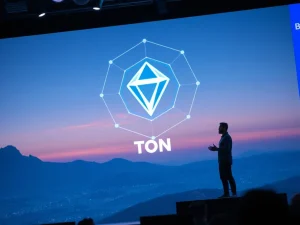Parag Agrawal AI Startup Unveils Groundbreaking AI Agent Future

The tech world is buzzing with significant news: Parag Agrawal, the former CEO of Twitter, now known as X, has re-emerged with a powerful new venture. His new company, Parallel Web Systems Inc., is an AI startup poised to revolutionize how artificial intelligence interacts with the internet. For those deeply invested in the rapid advancements of technology and its convergence with decentralized systems, Agrawal’s latest endeavor signals a profound shift. This move highlights a growing belief among industry leaders that AI agents will soon become integral to our digital lives, potentially reshaping everything from web interaction to blockchain applications. Consequently, understanding this development is crucial for anyone tracking the future of digital innovation.
Parag Agrawal AI Startup: A New Chapter Unfolds
Parag Agrawal, once at the helm of a global social media giant, has officially returned to the tech industry. His new company, Parallel Web Systems Inc., focuses intently on driving the next wave of AI agent research. This strategic pivot marks Agrawal’s first major public move since his departure from Twitter in October 2022. Significantly, he aims to build tools that empower artificial intelligence agents to autonomously gather and analyze information from the vast expanse of the web. This initiative represents a clear vision for the future of digital interaction.
Agrawal recently shared insights into his new venture via a LinkedIn post. He revealed that Parallel Web Systems Inc.’s flagship product is called Deep Research API. This powerful tool reportedly surpasses both human capabilities and leading AI models, including OpenAI’s GPT-5, on specific research benchmarks. Furthermore, Agrawal stated, “We already power millions of research tasks every day.” This indicates a substantial operational scale even at this early stage. He also mentioned that a public firm is currently automating human workflows using Parallel’s technology. Additionally, coding agents are leveraging its tools to locate documents and debug complex issues, showcasing its practical utility.
Bloomberg reported that Agrawal successfully raised $30 million in funding for Parallel. This substantial investment underscores investor confidence in his vision and the potential of his team. The company currently operates with a focused team of 25 individuals. This lean structure suggests an agile approach to innovation. Ultimately, Agrawal’s return signifies a dedicated commitment to the cutting edge of artificial intelligence, promising impactful developments in the years to come.
Unleashing the Power of AI Agents Future
Agrawal’s bold prediction positions AI agents future as the next frontier of internet usage. He firmly believes that these autonomous entities will soon outnumber human users online. This perspective aligns with a growing consensus among tech innovators about the transformative potential of AI agents. Imagine a scenario where numerous AI agents work on your behalf, navigating the internet to accomplish tasks. This could range from complex data analysis to simple daily errands, all executed without direct human intervention.
His initial foray into AI after leaving Twitter involved deep dives into research papers and extensive coding. He purposefully declined various offers from struggling tech firms, choosing instead to focus exclusively on AI. This deliberate decision highlights his conviction regarding the immense potential of artificial intelligence. Initially, Agrawal considered an AI-powered healthcare startup. However, his research led him to a more profound realization: AI agents, not humans, would become the web’s primary users. Consequently, this shift in focus shaped the direction of Parallel Web Systems Inc.
Agrawal envisions a near future where individuals deploy dozens of agents to interact with the internet on their behalf. He states, “There’ll be more agents on the internet than there are humans around. You will probably deploy 50 agents on your behalf to be on the internet.” He anticipates this monumental shift happening very soon, potentially within the next year. This vision paints a vivid picture of a highly automated and efficient digital landscape, driven by intelligent, autonomous software entities. Thus, the development of robust and reliable AI agents becomes paramount for future internet infrastructure.
Parallel Web Systems Inc. and Deep Research API’s Impact
The core of Agrawal’s new venture lies in Parallel Web Systems Inc. and its flagship product, Deep Research API. This API is designed to empower AI agents with advanced web research capabilities. It goes beyond simple search, enabling agents to:
- **Autonomously collect information:** Agents can independently browse and gather data from diverse web sources.
- **Analyze complex data:** The API provides tools for sophisticated analysis, identifying patterns and insights.
- **Outperform benchmarks:** Deep Research API shows superior performance compared to human researchers and even advanced AI models like GPT-5 in certain tasks.
- **Automate workflows:** Public firms are already using it to streamline operations previously requiring human input.
The implications of such a tool are far-reaching. For instance, coding agents can leverage Deep Research API to efficiently find relevant documentation and debug intricate software issues. This significantly accelerates development cycles and improves code quality. Furthermore, the ability to automate millions of research tasks daily demonstrates the API’s scalability and effectiveness. It provides a foundational layer for building more sophisticated and capable AI agents. Therefore, Deep Research API stands as a critical enabler for Agrawal’s broader vision of an agent-driven internet.
From Ex-Twitter CEO to AI Visionary
Parag Agrawal’s journey from leading Twitter to founding an Ex-Twitter CEO AI startup is noteworthy. He served as Twitter’s Chief Technology Officer under Jack Dorsey, where he was instrumental in building advanced machine learning models. Subsequently, he took over as CEO in November 2021, leading the company until October 2022. His tenure ended abruptly when Elon Musk acquired Twitter, leading to the ousting of Agrawal and other C-level executives. This transition marked a significant turning point in his career.
Following his dismissal, Agrawal immersed himself back into the world of AI research. He dedicated time to reading academic papers and writing code, reconnecting with his roots in machine learning. He openly shared his deliberate choice to focus on AI, turning down various opportunities that did not align with his core interest. Agrawal knew that AI was his next venture, driven by a profound understanding of its transformative potential. This period of intense research and reflection solidified his conviction that AI agents would fundamentally change how we interact with the digital world. Consequently, Parallel Web Systems Inc. is the direct outcome of this focused determination.
The legal dispute between the former executives and Elon Musk over severance pay continues. While a district court ruled to move the case forward in November, a final verdict remains pending. Despite these ongoing legal matters, Agrawal has clearly channeled his energy into innovation. His deep technical background and experience in leading a major tech platform provide him with unique insights into building impactful AI solutions. Thus, his leadership in Parallel Web Systems Inc. is grounded in extensive practical and theoretical knowledge.
The Intersection of AI Agents and Blockchain Technology
Agrawal’s bold predictions about the proliferation of AI agents resonate strongly within the cryptocurrency space. Coinbase developers, for example, have articulated a similar vision. They recently described autonomous AI agents as Ethereum’s future “biggest power user.” This convergence of AI and blockchain technology presents exciting possibilities. Specifically, the developers, Kevin Leffew and Lincoln Murr, highlighted how a little-used HTTP web standard, combined with Ethereum Improvement Proposal (EIP) 3009, could usher in a new era of e-commerce on the blockchain. This technical synergy promises to unlock unprecedented levels of automation and efficiency.
Imagine AI agents executing stablecoin transfers without any human involvement. This capability could enable a wide array of autonomous applications. For instance, self-driving taxis could automatically pay for their fuel upon refueling. Similarly, AI models could monetize content on demand, creating new economic paradigms. These scenarios illustrate the profound impact AI agents could have when integrated with decentralized ledgers. The ability for agents to interact directly with blockchain protocols, managing transactions and smart contracts, opens up entirely new ecosystems. Therefore, Agrawal’s focus on AI agents is highly relevant to the evolving landscape of Web3 and decentralized finance.
Navigating the Future of Digital Interaction
The emergence of advanced AI agents, championed by ventures like Parag Agrawal’s Parallel Web Systems Inc., signals a pivotal moment for digital interaction. These agents are not merely sophisticated chatbots; they are autonomous entities capable of performing complex tasks independently. Their ability to gather, analyze, and act upon information from the web represents a significant leap forward. This shift will likely transform how businesses operate, how individuals manage their digital lives, and how information flows across the internet. Consequently, understanding the implications of this technology is paramount for developers, businesses, and everyday users alike.
The vision of an internet populated by more agents than humans presents both immense opportunities and considerable challenges. Opportunities include unparalleled efficiency, personalized services, and the automation of tedious tasks. Challenges, however, may involve ethical considerations, security vulnerabilities, and the need for robust regulatory frameworks. As AI agents become more sophisticated, questions around their autonomy, accountability, and societal impact will inevitably arise. Therefore, ongoing research, responsible development, and collaborative discussions are crucial to harness the full potential of this technology safely and effectively.
Ultimately, Parag Agrawal’s new AI startup is not just another tech venture; it is a foundational effort to build the infrastructure for the next generation of the internet. By focusing on core AI agent research and developing powerful tools like Deep Research API, Parallel Web Systems Inc. is positioning itself at the forefront of this transformative wave. The future digital landscape will undoubtedly be shaped by these intelligent agents, promising a new era of connectivity and automation. This groundbreaking work could redefine our relationship with technology, creating a more efficient and interconnected world.








